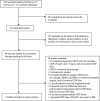Impact of C-reactive protein on in-stent restenosis: a meta-analysis
- PMID: 20200627
- PMCID: PMC2829784
Impact of C-reactive protein on in-stent restenosis: a meta-analysis
Abstract
We sought to evaluate the impact of C-reactive protein (CRP) levels on in-stent restenosis after percutaneous coronary intervention.The plasma level of CRP is considered a risk predictor for cardiovascular diseases. However, the relationship between CRP and in-stent restenosis has been a matter of controversy. Meta-analysis reduces variability and better evaluates the correlation.We performed a systemic search for literature published in March 2008 and earlier, using MEDLINE(R), the Cochrane clinical trials database, and EMBASE(R). We also scanned relevant reference lists and hand-searched all review articles or abstracts from conference reports on this topic. Of the 245 studies that we initially searched, we chose 9 prospective observational studies (1,062 patients).Overall, CRP concentration was higher in patients who experienced in-stent restenosis. The weighted mean difference in CRP levels between the patients with in-stent restenosis and those without was 1.67, and the Z-score for overall effect was 2.12 (P=0.03). Our subgroup analysis that compared patients with stable and unstable angina showed a weighted mean difference in the CRP levels of 2.22 between the patients with and without in-stent restenosis, and the Z-score for overall effect was 2.23 (P=0.03) in 5 studies of unstable-angina patients. There was no significance in 4 studies of stable-angina patients.In spite of significant heterogeneity across the studies, our meta-analysis suggests that preprocedurally elevated levels of CRP are associated with greater in-stent restenosis after stenting and that this impact appears more prominent in unstable-angina patients.
Keywords: Angina pectoris/epidemiology; C-reactive protein/analysis/metabolism; angioplasty, transluminal, percutaneous coronary; biological markers/blood; clinical trials as topic; coronary artery disease/etiology/physiopathology; coronary restenosis/etiology/pathology/prevention & control; inflammation/complications; risk factors; stents/adverse effects.
Figures





Comment in
-
Inflammation, high-sensitivity C-reactive protein, and vascular protection.Tex Heart Inst J. 2010;37(1):40-1. Tex Heart Inst J. 2010. PMID: 20200625 Free PMC article. No abstract available.
Similar articles
-
Comparison of effects of drug-eluting stents versus bare metal stents on plasma C-reactive protein levels.Am J Cardiol. 2005 Nov 15;96(10):1384-8. doi: 10.1016/j.amjcard.2005.07.042. Epub 2005 Sep 27. Am J Cardiol. 2005. PMID: 16275183
-
Predictive value of preintervention C-reactive protein on clinical outcome after directional coronary atherectomy followed by stent implantation.Cardiovasc Revasc Med. 2007 Jul-Sep;8(3):156-60. doi: 10.1016/j.carrev.2007.02.002. Cardiovasc Revasc Med. 2007. PMID: 17765643
-
Inflammatory response after intervention assessed by serial C-reactive protein measurements correlates with restenosis in patients treated with coronary stenting.Am Heart J. 2005 Aug;150(2):344-50. doi: 10.1016/j.ahj.2004.09.030. Am Heart J. 2005. PMID: 16086941
-
Association between C-reactive protein and angiographic restenosis after bare metal stents: an updated and comprehensive meta-analysis of 2747 patients.Cardiovasc Revasc Med. 2008 Jul-Sep;9(3):156-65. doi: 10.1016/j.carrev.2008.01.003. Cardiovasc Revasc Med. 2008. PMID: 18606379 Review.
-
[Clinical value of inflammatory biomarkers after stent implantation].G Ital Cardiol (Rome). 2011 Oct;12(10):635-44. doi: 10.1714/945.10348. G Ital Cardiol (Rome). 2011. PMID: 21947106 Review. Italian.
Cited by
-
Preprocedural C-Reactive Protein Predicts Outcomes after Primary Percutaneous Coronary Intervention in Patients with ST-elevation Myocardial Infarction a systematic meta-analysis.Sci Rep. 2017 Jan 27;7:41530. doi: 10.1038/srep41530. Sci Rep. 2017. PMID: 28128312 Free PMC article.
-
The association of preprocedural C-reactive protein/albumin ratio with in-stent restenosis in patients undergoing iliac artery stenting.J Cardiovasc Thorac Res. 2020;12(3):179-184. doi: 10.34172/jcvtr.2020.31. Epub 2020 Aug 16. J Cardiovasc Thorac Res. 2020. PMID: 33123323 Free PMC article.
-
FCGR2A-HH Gene Variants Encoding the Fc Gamma Receptor for the C-Reactive Protein Are Associated with Enhanced Monocyte CD32 Expression and Cardiovascular Events' Recurrence after Primary Acute Coronary Syndrome.Biomedicines. 2022 Feb 19;10(2):495. doi: 10.3390/biomedicines10020495. Biomedicines. 2022. PMID: 35203703 Free PMC article.
-
The decline effect in cardiovascular medicine: is the effect of cardiovascular medicine and stent on cardiovascular events decline over the years?Korean Circ J. 2013 Jul;43(7):443-52. doi: 10.4070/kcj.2013.43.7.443. Korean Circ J. 2013. PMID: 23964290 Free PMC article.
-
Inflammation, high-sensitivity C-reactive protein, and vascular protection.Tex Heart Inst J. 2010;37(1):40-1. Tex Heart Inst J. 2010. PMID: 20200625 Free PMC article. No abstract available.
References
-
- Li JJ. Inflammation: an important mechanism for different clinical entities of coronary artery diseases. Chin Med J (Engl) 2005;118(21):1817–26. - PubMed
-
- Maseri A. Inflammation, atherosclerosis, and ischemic events –exploring the hidden side of the moon. N Engl J Med 1997; 336(14):1014–6. - PubMed
-
- Ross R. Atherosclerosis–an inflammatory disease. N Engl J Med 1999;340(2):115–26. - PubMed
-
- Li JJ, Fang CH. C-reactive protein is not only an inflammatory marker but also a direct cause of cardiovascular diseases. Med Hypotheses 2004;62(4):499–506. - PubMed
-
- van der Meer IM, de Maat MP, Kiliaan AJ, van der Kuip DA, Hofman A, Witteman JC. The value of C-reactive protein in cardiovascular risk prediction: the Rotterdam Study. Arch Intern Med 2003;163(11):1323–8. - PubMed
Publication types
MeSH terms
Substances
LinkOut - more resources
Full Text Sources
Medical
Research Materials
Miscellaneous
